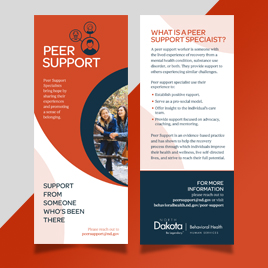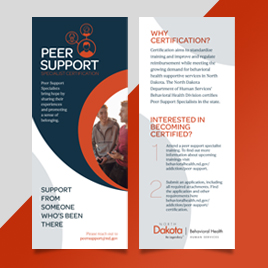A peer support specialist is someone with the lived experience of recovery from a mental health condition, substance use disorder, brain injury, or any combination thereof. They provide behavioral health services and support to others experiencing similar challenges.
Through shared understanding and mutual empowerment, peer support specialists help others become and stay engaged in the recovery process by using their lived experience, and skills learned in formal Peer Support Specialist Training.
Peer Support Services are essential in developing a recovery-oriented system and go beyond the reduction or elimination of symptoms to encompass self-actualization, community, and overall wellness.
A peer support specialist must:
a) self-identify as an individual who has personal lived experience and is willing to publicly identify as an individual in recovery from a mental health disorder, substance use disorder, traumatic brain injury, or any combination thereof; or
b) be a family member who has personal lived experience with an individual with a mental health disorder, substance use disorder, traumatic brain injury, or any combination thereof.
Peer support is effective, and can:
- Improve quality of life and life satisfaction
- Increase social support and social functioning
- Improve whole health, including conditions like diabetes.
- Improve engagement and satisfaction with services and supports.
- Decrease hospitalizations and healthcare costs
Spread the Word
Download or order Peer Support rack cards.




